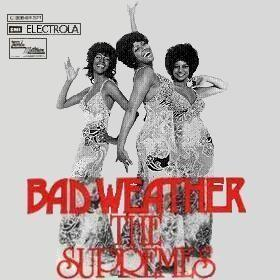
Scherrie Ann Payne is an American singer. Payne is best known as the third and last lead singer of the R&B/Soul vocal group The Supremes from 1973 until 1977. Because of her powerful voice and petite stature (5'2"), Payne is sometimes referred to as "the little lady with the big voice." Payne is the younger sister of singer Freda Payne. Payne continues to perform, both as a solo act and as a part of the "Former Ladies of the Supremes" (FLOS).

"Up the Ladder to the Roof" is a 1970 hit single recorded by The Supremes for the Motown label. It was the first Supremes single to feature new lead singer Jean Terrell in place of Diana Ross, who officially left the group for a solo career two weeks before the recording of this song in January 1970. This song also marks a number of other firsts: it is the first Supremes single since "The Happening" in 1967 to be released under the name "The Supremes" instead of "Diana Ross & The Supremes", the first Supremes single solely produced by Norman Whitfield associate Frank Wilson, and the first Supremes single to make the United Kingdom Top 10 since "Reflections" in 1967.

High Energy is the twenty-eighth studio album by American girl group the Supremes, released in 1976 on the Motown label. The album is the first to feature Susaye Greene; former member of Stevie Wonder's Wonderlove; and is notable for featuring the last Billboard Hot 100 Top 40 pop hit for the group, "I'm Gonna Let My Heart Do the Walking". Of their 1970s releases, High Energy is the second-highest charting album on the US Billboard 200, the first being Right On (1970). In Canada, High Energy is the highest-charting Supremes album since TCB (1968).

The Supremes is the twenty-seventh studio album by The Supremes, released in 1975 on Motown Records.

Mary, Scherrie & Susaye is the twenty-ninth and final studio album by The Supremes, released in 1976 on the Motown label. It featured the final line-up for the Supremes, composed of original Supreme Mary Wilson and latter-day members Scherrie Payne and Susaye Greene. All three Supremes take leads on the album. The album was a mixture of disco dance tracks (Hi-NRG) and R&B ballads. Payne and Greene mostly took over the dance tracks while Wilson performed the ballads. The album was released in October 1976, nine months before the trio disbanded.

"My World Is Empty Without You" is a 1965 song recorded and released as a single by the Supremes for the Motown label.

Mary Wilson is the debut solo album by the founding Supremes member, Mary Wilson, released on the Motown label in 1979.

"Love Is Like an Itching in My Heart" is a 1966 song recorded by the Supremes for the Motown label.

"Floy Joy" is a song written by Smokey Robinson and released as a single in December 1971 by popular Motown female singing group The Supremes.

"Forever Came Today" is a 1967 song written and produced by the Motown collective of Holland–Dozier–Holland, and was first made into a hit as a single for Diana Ross & the Supremes in early 1968. A disco version of the song was released as a single seven years later by Motown group the Jackson 5.

"Nothing but Heartaches" is a 1965 song recorded by The Supremes for the Motown label.

"Automatically Sunshine" is a song written by Smokey Robinson and released as a single by Motown singing group The Supremes as the second single from their popular album Floy Joy in 1972.

"Bad Weather" is a song recorded and released as a single by Motown vocal group The Supremes in 1973. It was composed by Stevie Wonder and Lynda Laurence's brother Ira Tucker Jr., and produced by Wonder. The song was then-lead singer Jean Terrell's last charted single as a member of the Supremes and the second and last time Laurence was featured on a Supremes single.

"I'm Gonna Let My Heart Do the Walking" is a disco-styled soul single composed by the Holland brothers Eddie and Brian, members of the former Holland–Dozier–Holland team and was released as a single by Motown vocal group The Supremes in 1976 on the Motown label. It was the first single since "Your Heart Belongs to Me" in 1962 to feature four Supremes. It is also notable for being the last top forty single the group would score before they disbanded in 1977.

"Everybody's Got the Right to Love" is a socially conscious–inspired pop song written by Lou Stallman, produced by Frank Wilson and released as a single in 1970 by Motown group The Supremes, who took the song into the top forty in mid-1970 following the release of "Up the Ladder to the Roof".

“You Gotta Have Love in Your Heart” is a duet single between Motown singing groups The Supremes and the Four Tops, released as a single from their The Return of the Magnificent 7 album in 1971. The single became a modest charter peaking at #55 on the U.S. Billboard Hot 100 chart and #41 on the U.S. Billboard R&B Singles Chart. The single fared better in the UK, where it reached #25 in the official top 50 single chart. Lead vocals were by the groups' respective lead singers Jean Terrell and Levi Stubbs.

"No Matter What Sign You Are" is a song released for Diana Ross & the Supremes by the Motown label.

"Where Do I Go from Here" is a single released by Motown singing group The Supremes. It is the second single released from their 1975 self-titled album, The Supremes. The single reached #93 on the US Billboard R&B chart.

"You're My Driving Wheel" is a dance/disco song by The Supremes. The song was released on September 30, 1976 as the first single from their album Mary, Scherrie & Susaye. Along with the tracks, "Let Yourself Go" and "Love I Never Knew", "You're My Driving Wheel" peaked at number five on the disco chart. On the Soul chart, the single peaked at number fifty and number eighty-five on the Hot 100.

"Let Yourself Go" is a disco song recorded by the Supremes. It was written by Harold Beatty, Eddie Holland and Brian Holland. The song was released on January 25, 1977 as the second single from The Supremes' Mary, Scherrie & Susaye album, and the last one by the group officially released in the US, ever. The song peaked at #83 on the US R&B charts.




















